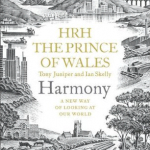Wisdom before knowledge

This is a page inspired by the book by HRH Prince Charles, The Prince of Wales. I’ve probably got his title wrong.
To quote the Harmony movie website (www.theharmonymovie.com):
HARMONY IS….
Creating excitement, urgency and action, Harmony reaches out to various and diverse communities, organizations, NGOs and individuals who can help promote the values and ideas of the film through their work. Harmony aims to unite the global community in an effort to transform the world, address the global environmental crisis and find ways toward a more sustainable, spiritual and harmonious relationship with the planet.
I hope everyone has the sense to listen. It feels like common sense to me, but it seems that only statistics count these days.
People often accuse green types of craving some lost rural idyll. As HRH says, nothing could be further from the Truth. What I would say is, we managed pretty well without statistics, narrow science and industrialisation for a good few thousand years. We must have known something.
I have huge respect for science, but it’s not what it used to be and, as Ben Goldacre brilliantly demonstrates in Bad Science, we’ve got it all out of proportion. The press mess with it constantly.
What I think Harmony is saying is that science is not our only hope. It’s part of the solution, but cannot provide everything we need.
I worry that our obsessive “rationalism”, where we believe nothing we can’t prove, is preventing us from getting faster to the solutions we need. It seems crazy to look for answers using only the tools that caused the problems in the first place. We are like the big computer companies, launching more and more patches and repairs as if they are breakthroughs, when in fact they are just fixing things that should never have gone wrong in the first place.
Of course, we’ve always had science. Druids, hunter gatherers, Celts, whoever, were scientists – they tried things and if they worked they tried them again. If they worked consistently, they passed the knowledge on.
But they applied the process to everything, not just narrow fields of research. They saw the world whole and did not try to break it down or work against it. They had the wisdom to recognise the connectedness of things.
I think today we privilege knowledge above wisdom. The more we know, the less we understand, because the way we gather knowledge separates and categorises each piece. Look, for example, at what we have done to music – iTunes is riddled with “Genres”, as if every piece of music must fit some known definition. It’s no surprise that the music business is in disarray; there are so many genres reaching so many tiny markets that no-one can command a broad and sustainable fan base.
So let’s stop for a moment. Step back, listen to our instincts – or our right brains, if you insist on being scientific about it.
Perhaps if we just stop and listen, we’ll hear the Harmony.